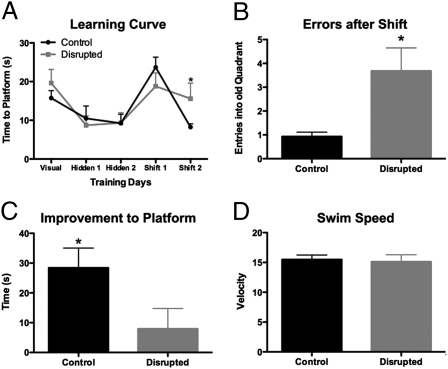Fig. 3.
Disrupted circadian rhythms are associated with changes in cognition. CD mice showed normal acquisition of a modified Morris watermaze task, but were impaired when made to shift their learning to a new quadrant, with control animals performing better on the second reversal than CD mice (two-way RM ANOVA, F1,18 = 8.97, P = 0.0078; Bonferroni posttest P = 0.02; A). On the test day, CD mice made numerous errors by returning to the old platform location (t test with Welch's correction for unequal variances, P = 0.0212; B), and showed very little improvement in their ability to find the new platform location from the previous shift day (t test, P = 0.0237; C). There were no differences in swim speed on test day (t test, P = 0.7918; D).

